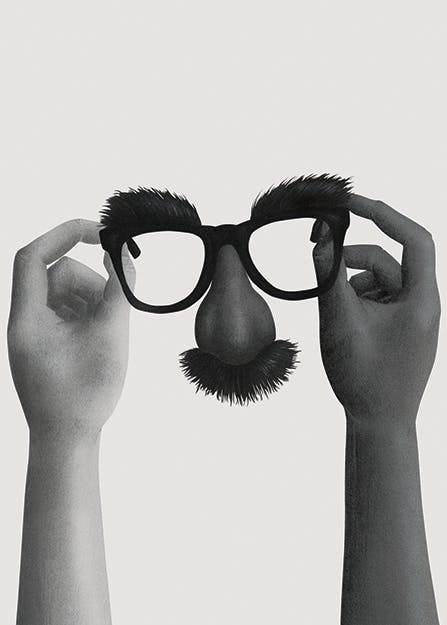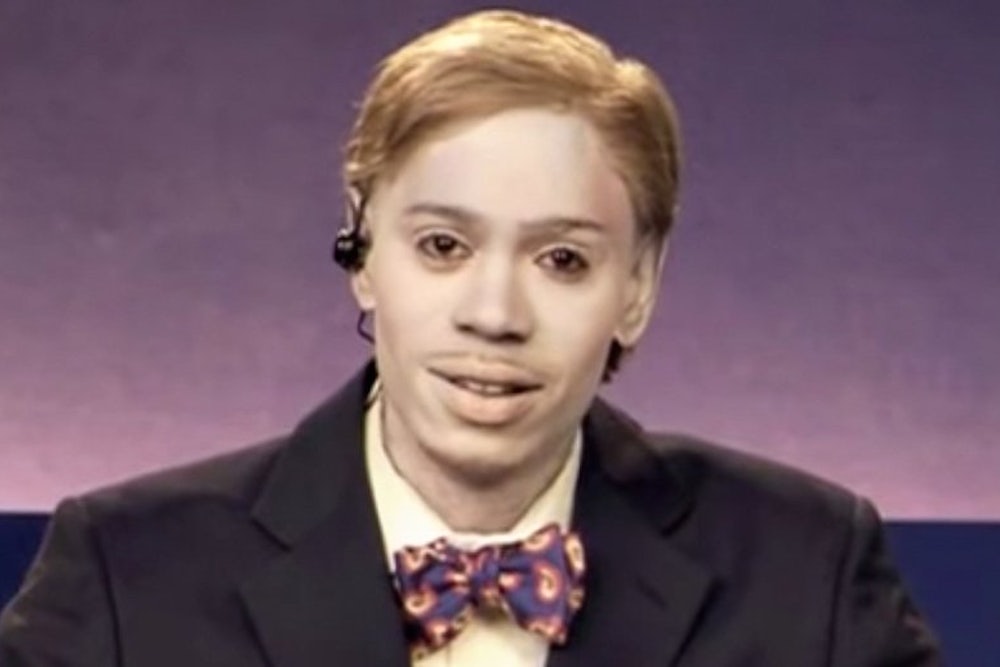I love making fun of white people. I do it every day. It garners laughs, which, as a humorist, is what I want most in this world. (The thing I want second most? For white people to stop trying to pass off casseroles as real food.)
But as a black woman, there’s also another, more elemental reason for telling jokes at white people’s expense. The reason is not that I hate white people (some of my best friends are white!) but that this sort of racialized humor is an instrument that people of color can use to placate themselves in the face of the overwhelming reality: It’s just better to be Caucasian. By making fun of white people, people of color can, in a small way, push back against stereotypes, opposing racial humor by inverting it.
No, this is not the most effective way to fight prejudice. But it is one of the most enjoyable. By way of example, let’s do a search for “white people be like”— one of the most popular vehicles for these jokes—on Twitter and Tumblr:
“White people be like ‘40 degrees F is the perfect weather to wear basketball shorts and flip-flops.’”
“White people be like, ‘I’m not just white, I’m: 22% Irish, 18% German, 28% Italian, 30% French, 2% Milk.’”
“White people: Yah my eyes are so cool they’re like sapphire blue, but then change to a rainforest green in the light, and sometimes they turn gray when I wear my favorite sweater, also they look indigo when I’m at Olive Garden.”
Those lines (and many others that I could have included, if I had room) were all sourced from the online accounts of Asians, blacks, Latino/as etc. Share them, and you gain membership in a club open to all people of color, a space impervious to white hegemony.
But keep reading. You’ll find some white people making the same sorts of quips—and often joking the hardest.
“White people be like ‘Taco Bell is too spicy!’” riffs a Twitter account run by one of those white people. “Most of the Patagonia pullovers are sold out until next fall #whitepeopleproblems,” goes another. Meme historians will here note the debt to Stuff White People Like, the blog turned book that is an ur-text for today’s white-on-white racial humor. It featured such witticisms as, “White people like living by the water,” and, “White people like Asian fusion food.”
This is how the party ends—with white people wanting in on the joke so badly that they create a separate category of “cool” white people who mock their own whiteness in an effort at solidarity. “White people be like ‘white people be like,’ but they be the white people that white people be like!!!!” as one Tumblr post neatly summarized.
I’m not trying to bar white people from being self-deprecating—far from it. But when a source of solace for people of color is co-opted this way, does it lose all its power? Is it funny anymore? And if it is, is it still OK to laugh?
People of color have been making fun of white people for a long time. One academic paper I found, Joseph S. Amditis’s magnificently titled “White Men Can’t Joke,” asserts that the genre dates back to slavery, when it provided a means of uplift. Unconsciously, this humor was adhering to a tacit understanding that now exists within the comedy world, outlining the fuzzy margins of what’s inbounds. Comedians are always supposed to punch up; i.e., if you’re going to make fun of people, don’t make fun of people who have less privilege than you do. It’s why LGBTQ comedians can make fun of straight people, why single people can make fun of married people, why women can make fun of men. If you are a black person in the 1800s, and there’s a white man who owns you, beats you, and tears your family apart, then it’s totally fine to crack a joke about his waistcoat to your friends.

I’m guessing it’s also why Douglas Turner Ward found so much success writing and staging his play Day of Absence in 1965. Performed exclusively by blacks in whiteface, the reverse-minstrel show revolved around the white citizens of a sleepy Southern town who go into a frenzy when they realize that all of their black neighbors are missing. The funny comes from the increasing illogic of the bewildered characters (“there’s rising sentiment favoring burning to find out whether they’re underground”); the bite comes from the fact that these white people, who simultaneously disdain and begrudgingly depend on their town’s black residents, are being portrayed by black actors. In his production notes, Turner wrote that the show can “also be performed by whites—at their own risk.” He went on to win a Drama Desk award for playwriting.
Eddie Murphy’s 1984 “Saturday Night Live” skit, White Like Me, was a breakthrough—white people made fun of for a mainstream, if not primetime, audience. In a riff on Black Like Me, an autobiography of a white man who travels through the South disguised as a black man in order to see racism firsthand, Murphy dons whiteface (and brilliantly stiffens his gait) in order to investigate a world previously unavailable to him, which turns out to be full of cocktail parties and complimentary newspapers. “Well, I learned that we still have a very long way to go in this country before all men are truly equal,” he says at the end, “but I’ll tell you something—I’ve got a lot of friends, and we’ve got a lot of makeup.”
Comedy about white people can obviously vary in tone. Paul Mooney’s 1993 album, Race, was unapologetically scathing. Between jokes built on a by now familiar template—basically, Can you believe white people do this one crazy thing?, over and over—the former “In Living Color” and “Sanford and Son” writer directly aired earnest and profound frustrations with white members of his audience. (One of Mooney’s “white people be likes” went as follows: “See, with race, white folks have been racist against everybody, and running shit, and as long as they’re in charge, it’s cool.”) The Wayans Brothers’ socialite crime caper, White Chicks, was hopelessly, contentedly silly and crass (“Once you go black, you’re going to need a wheelchair,”) making no attempt at the teachable moments usually worked in to justify such audacious send-ups of stereotypes. Franchesca Ramsey’s YouTube hit, “Shit White Girls Say to Black Girls”—simultaneously an extension and a spoof of the Shit ____ Say formulas that swept the Internet in 2012—fell somewhere in between: “Jews were slaves too. And you don’t hear us complaining about it all the time.”
But what most white-people jokes have in common is that they are not about white people per se. Instead, they are about inequalities between whites and other races. “What is the scariest thing about a white person in prison?” a comedian asks. “You know he did it.” Har har! Except you only got the punchline because you’re aware of the problem of prejudicial prosecutions. In sum: “LOL, RACISM.”
In rarer cases where white people are the actual target, the joke tends to zoom in on a certain sector of the population—hippies, rednecks, anyone who is both white and poor—and rests on observations about socioeconomic circumstances, not the disadvantages posed merely by having a certain color skin. So when a white person tells any white-people joke, the humor can go from subverting whites’ status to rubbing it in. The jokes themselves aren’t necessarily less funny; it’s just that the bitter pill goes down easier when not delivered by someone benefiting from the privilege they’re trying to lampoon.
All of which is to say that the teller of white-people jokes bears a special responsibility. White-people jokes don’t punch up; at best, they punch sideways, but usually, they punch down. This doesn’t mean that white people can never tell them. But I do believe that anyone who tells a white-person joke really has to understand what they’re doing. “Jokes have power to be tools to dismantle oppression, to prove racism, but also to reinforce racism and privilege,” says Keisha Zollar, an African American comedian with the Upright Citizens Brigade. “Is the comedian telling the joke aware of that power?”
A lot of the white people making white-people jokes apparently are not. “My level of ‘can’t even’ today is higher than a white girl in Ugg boots with a pumpkin spice frappuchino (sic) wearing a North Face jacket,” read a recent clueless white-person tweet. One more thing white people like: beating a joke to death.
But sometimes a white comedian gets it right, realizing what’s at the core of every joke about white people and placing it front and center. “I’m not saying white people are better, but I’m saying being white is clearly better,” begins a perceptive bit by Louis C.K. “Who could even argue? I’m a white man. You can’t even hurt my feelings! What could you really call a white man that really digs deep? ‘Hey, cracker!’ Ugh, ruined my day... bringing me back to owning land and people. What a drag.” The ultimate #whitepeopleproblem, but this time dosed with self-awareness.
